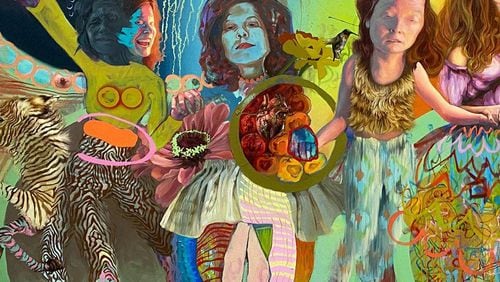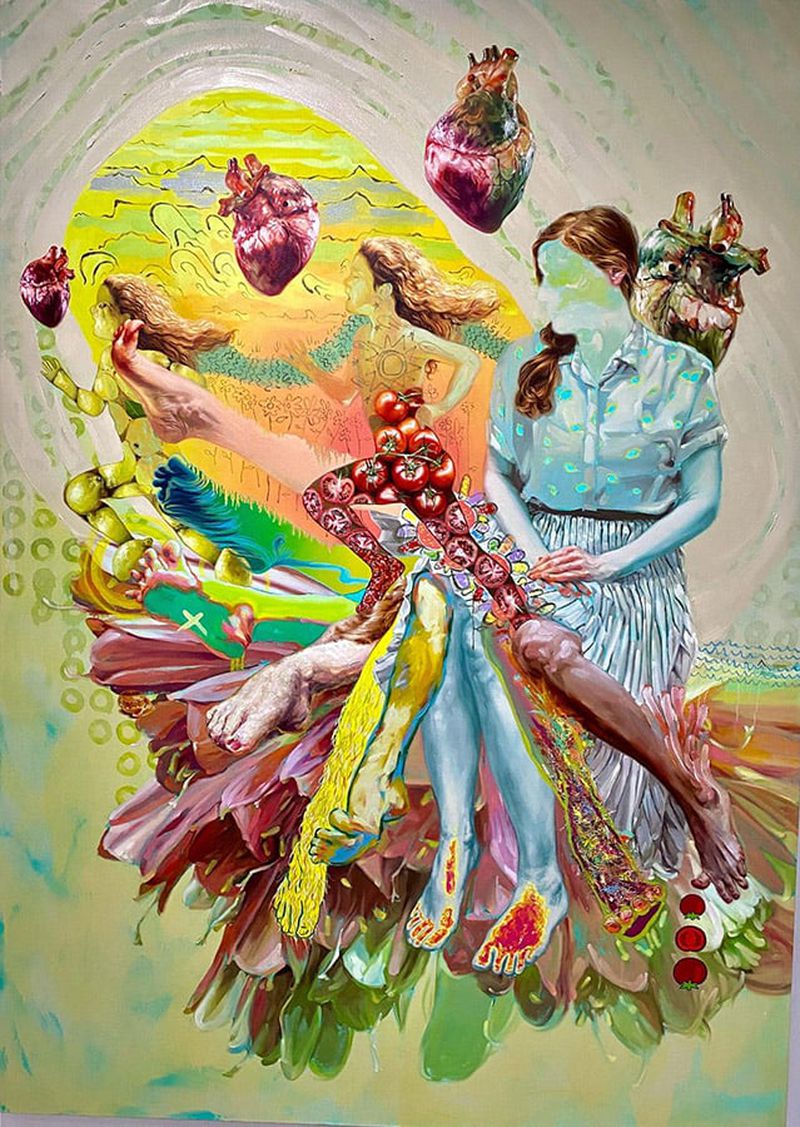This story was originally published by ArtsATL.
Amanda Grae Platner’s “It’s Still Not Me, It’s You,” at Echo Contemporary Art through April 20, is a body of work with uncomfortable implications about the inability of persons “to acknowledge perspectives outside of their own experiences,” as Platner’s artist’s statement puts it. This goes far beyond the incomprehension of visible behaviors in the case of Platner’s multiple sclerosis, which has invisible consequences that are easily misinterpreted.
The point of Platner’s sculptures and paintings, all of which are unconventional versions of self-portraiture, is that all of us operate on false assumptions about the inner lives of others. Those assumptions are based on multiple factors that don’t correlate with the assumed default position of “normality.” The cultivation of empathy, of genuinely perceiving others’ experience, is the only solution to the universal tendency to operate on faulty beliefs about others instead of “seeing each other as complex beings navigating the world in our own unique ways.”
The most startling index to Platner’s complex being is a double-sided panel painting of front and back views of the artist’s naked body, with niches cut into the figure in which rotating panels can be changed to different views via knobs on the edge of the panel. One such small rectangle features a realistic depiction of the artist’s mouth on one side, a cartoonishly wide smile on another and the jaws of a snarling beast on a third.
Another such slender panel includes an appropriately positioned picture of intestines plus an empty pickle jar that gives the whole artwork its title, “I Opened My Guts, You Recycled Them with a Pickle Jar.” The metaphor in this case is clear enough: The artist “opened her guts” in honest emotional vulnerability, and the recipient treated the expression of openness as something to be gotten rid of like the recyclable parts of the household garbage.
Credit: Courtesy of Echo Contemporary Art
Credit: Courtesy of Echo Contemporary Art
Other parts of Platner’s personal symbolism are much more opaque, precisely because they are personal rather than shared cultural symbols. Some shared symbols are only represented more literally than usual, such as the various anatomical hearts floating in space in the painting “Never Let an Orange Go Bad” or the eroticized tomatoes in that same painting, a symbol that is implicitly explicated in the title of the self-portrait “She’s a Tomato.” (The sexual symbolism in such works as “The Usual Compromise” is much more genitally literal than this. In that work, the fact that the viewer must walk on part of the artwork to operate its interactive part is meant to arouse discomfort in art-sensitive individuals.)
Such parts of the show as a video in which Platner is shown biting into and painfully chewing a succession of lemons are likely to arouse a visceral response. Other parts are simultaneously visceral and enigmatic, most notably the powerful painting “Suck It Up Buttercup,” in which a half-dozen versions of portraits of the artist float side by side, amid a carnivalesque swirl of cosmic globes, quasi-cellular agglomerations and occasional bits of randomness such as a zebra. It is a brilliantly composed work of art, but only small fragments of it fit comfortably into any set of familiar cultural references.
This makes it an excellent metaphor for the larger tangles of mutual misunderstanding that afflict a world that has grown both globalized and custom tailored for private consumption. In the end, we are defined by our own increasingly constricted presuppositions about the world, and the world grows more confrontational as a result.
ART REVIEW
“It’s Still Not Me, It’s You”
Works by Amanda Grae Platner. Through through April 20 at Echo Contemporary Art. Noon-5 p.m. Wednesday-Saturday, 785 Echo St. NW, Atlanta.
Credit: ArtsATL
Credit: ArtsATL
MEET OUR PARTNER
ArtsATL (artsatl.org) is a nonprofit organization that plays a critical role in educating and informing audiences about metro Atlanta’s arts and culture. ArtsATL, founded in 2009, helps build a sustainable arts community contributing to the economic and cultural health of the city.
If you have any questions about this partnership or others, please contact Senior Manager of Partnerships Nicole Williams at nicole.williams@ajc.com.








